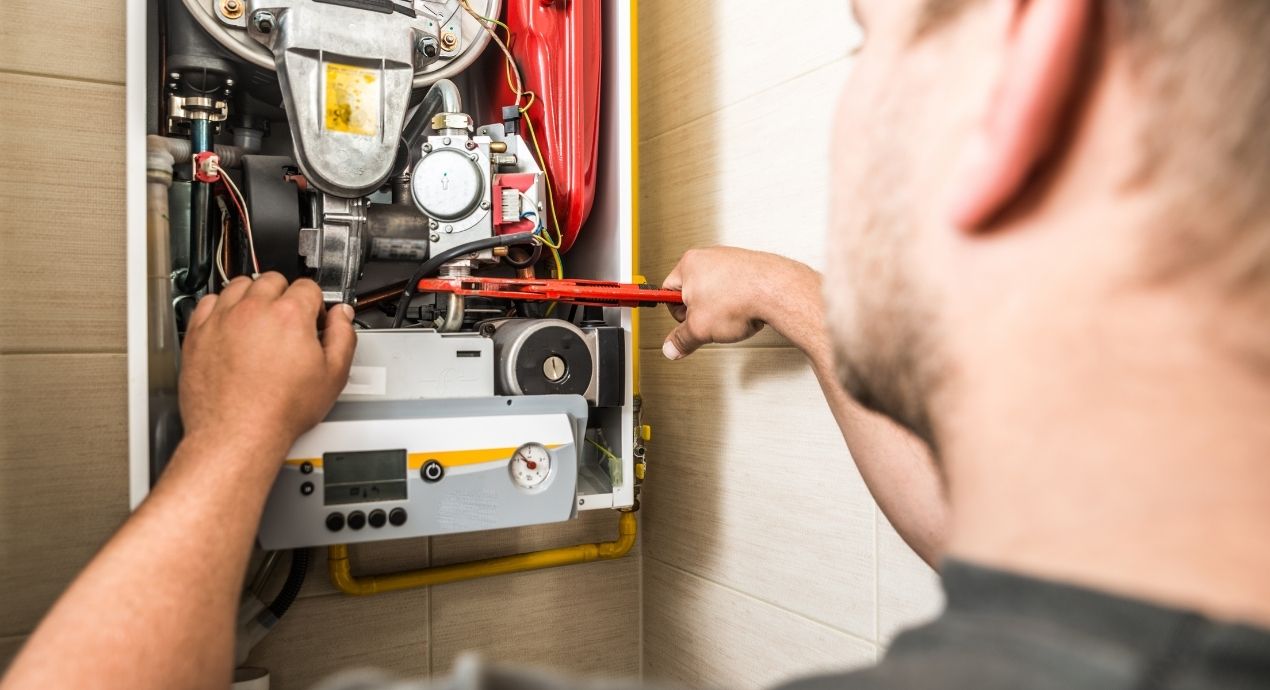
Contemplating coverage?
Subscribe to receive our emails & get
$200 off!
Have questions?
Call us: (833) 544-8273


Written By Ellie Brooks
If you have an older furnace in your home, it can be difficult to decide between repairing the appliance or replacing it altogether when a problem arises. On the one hand, a replacement furnace can be several thousands of dollars—certainly a financial setback for the average homeowner. On the other hand, spot repairs may just be delaying the inevitable, and repeated furnace repair service can add up to a hefty sunk cost.
This article will provide you with the information you need to make a more informed decision when it comes to furnace repair or furnace replacement.
There's a reason Liberty Home Guard was rated the #1 Home Warranty
Service by U.S. News and World Report for 2021, 2022, 2023, and 2024. Check out our services.
Catching potential problems with your furnace early can make repairing it the more justifiable choice. Some minor problems are relatively inexpensive to resolve—and you might even be able to resolve some problems yourself. Neglecting your appliance can cause cascading component failures, driving up the total furnace repair cost.
Here are some warning signs that may suggest your furnace requires service or minor repair.
If you notice something amiss with your furnace, there are a few basic checks you can perform to diagnose the problem. In some cases, the fix is reasonably straightforward and does not require the help of a licensed technician. Here are some tips for furnace repair.
It may sound obvious, but the first step in troubleshooting furnace problems is confirming that the appliance is drawing power. Someone may have powered it off inadvertently, or excessive power usage tripped the circuit.
Look for indicator lights to confirm the furnace is powered on. If the furnace won’t draw power even when switched on, reset the circuit at the breaker box. If you have an older home with a fuse box, determine if a fuse needs to be replaced.
If you continue to have issues, you can troubleshoot the circuit with a phone charger or other small appliance. Contact an electrician if there appears to be a problem with the circuit. Find a furnace repair specialist if you determine the furnace is faulty.
If your thermostat uses batteries, try replacing them to resolve your heating issues. If you have a smart thermostat, run a software update or perform a hard reset.
You can also spot-check the wiring at the furnace end to see if any wires are frayed or disconnected.
Furnaces use filters to remove particulate matter from the air. These filters become dirty over time, and a dirty filter makes for an inefficient furnace. Some furnaces have reusable filters that must be cleaned by hand. Others have disposable filters, and you can find replacements at a hardware store.
If you think you’ve neglected your furnace’s filter for some time, clean or replace it as needed.
Obstructed registers are a common source of inconsistent home temperatures. Vents and registers must be open for your furnace to properly distribute heat through your ductwork.
Go from room to room to confirm that all registers are open. Adjust the placement of furniture, plants, rugs, and other items as needed to keep them from blocking the registers.
If you have an older gas furnace, an extinguished pilot light can be the source of your heating trouble. Perform a check to see if the light has gone out. Relight as needed.
If the above tips fail to resolve your furnace trouble, you should contact a professional technician to diagnose the problem. There are several potential reasons for malfunction, such as:
A reputable HVAC technician who is up to date on furnace repair requirements mandated by the government can also help you decide if your furnace is worth repairing or replacing. Your technician may suggest that you replace your furnace if the appliance is more than 15 years old, or if the cost of repair is upwards of half of the price of a new unit.
A warranty with home heating coverage can alleviate much of your anxiety about expensive furnace repair. If your appliance develops a problem, we at Liberty Home Guard will work with our partner technicians to advise you on whether repair or replacement is appropriate. Whichever the case, the cost won’t be yours to bear—your home warranty will cover the expense.
Coverage isn’t limited to your home heating system either. You can bundle coverage for all your home systems and appliances.
Use our website or call (866)-681-0820 for a free quote.
Stay Ahead of Potential
Home Mishaps!
Subscribe to our Liberty Home Guard Newsletter and gain access to exclusive content that ensures your peace of mind.